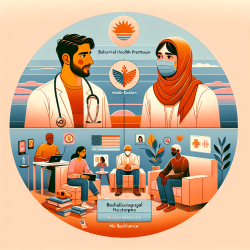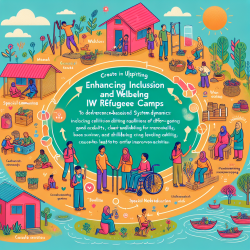In the field of speech-language pathology, making data-driven decisions is crucial to creating positive outcomes for children. Recent advancements in telehealth offer promising new avenues for practitioners. A study titled "Bringing the Laboratory Home: PANDABox Telehealth-Based Assessment of Neurodevelopmental Risk in Children" (Kelleher et al., 2020) offers significant insights that can help practitioners enhance their skills and improve child outcomes.
Key Findings from the PANDABox Study
The PANDABox (Parent-Administered Neurodevelopmental Assessment) protocol was designed to be a low-cost, caregiver-facilitated, remotely administered assessment tool for collecting integrated clinical, behavioral, and spectral data. The study involved 16 geographically diverse caregivers and their infants with Down syndrome, assessing attention, language, motor, and atypical behaviors.
1. High Caregiver Fidelity and Satisfaction
The study found high caregiver fidelity (94%) and satisfaction (97% positive). This indicates that caregivers can effectively administer simple, examiner-guided assessment tasks with high fidelity, which is crucial for telehealth interventions. Practitioners can leverage this by providing clear, concise instructions and ongoing support to caregivers.
2. Low Resource Requirements
PANDABox required minimal resources to administer, making it a cost-effective solution for remote assessments. Practitioners can adopt similar low-cost, scalable telehealth solutions to reach more children, especially those in geographically isolated or underserved areas.
3. High Data Quality
The study demonstrated that high-quality, integrated data could be collected remotely. Missing data rates were low for video frames (3%) and vocalization recordings (6%). This suggests that telehealth can be a reliable method for collecting essential data, allowing practitioners to make informed decisions based on robust evidence.
4. Flexibility and Customization
PANDABox is a modular battery, meaning tasks can be modified to suit various research questions and participant samples. Practitioners can benefit from adopting flexible telehealth tools that can be tailored to meet the specific needs of each child, thereby enhancing the accuracy and relevance of assessments.
Practical Applications for Practitioners
Based on these findings, here are some actionable steps practitioners can take:
- Training and Support: Ensure caregivers receive thorough training and ongoing support to maintain high fidelity in administering assessments.
- Low-Cost Solutions: Utilize cost-effective telehealth tools to extend services to underserved populations.
- Data Integration: Employ methods to integrate various data types (e.g., behavioral, spectral) to provide a comprehensive assessment of each child's development.
- Customization: Adapt assessment protocols to meet the specific needs of each child, ensuring that the tools are relevant and effective.
Encouraging Further Research
While the PANDABox study provides valuable insights, further research is essential to refine these methods and explore their applications across different populations and settings. Practitioners are encouraged to participate in or conduct research to continue advancing the field of telehealth-based assessments.
To read the original research paper, please follow this link: Bringing the Laboratory Home: PANDABox Telehealth-Based Assessment of Neurodevelopmental Risk in Children.










